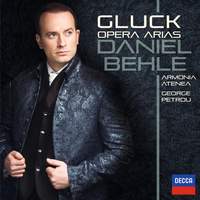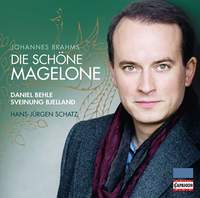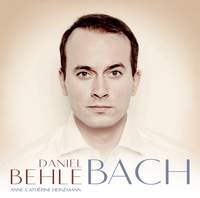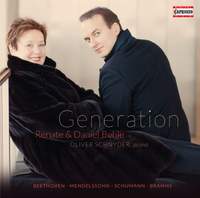Interview,
Daniel Behle on Gluck's tenors
 In comparison with last year's plentiful anniversary celebrations for Britten, Verdi and Wagner, this year's Gluck tercentenary has rather slipped under the radar in opera-houses and recording-studios alike - so Daniel Behle's classily sung and imaginatively programmed profile of the composer's writing for tenor is an especial treat. Acclaimed in lieder, Mozart and baroque repertoire, Behle has to be one of my very favourite tenors of the moment, endowed with an innate gift for elegant phrasing and a distinctive, crisp timbre that harks back to the glory-days of Anton Dermota and Fritz Wunderlich.
In comparison with last year's plentiful anniversary celebrations for Britten, Verdi and Wagner, this year's Gluck tercentenary has rather slipped under the radar in opera-houses and recording-studios alike - so Daniel Behle's classily sung and imaginatively programmed profile of the composer's writing for tenor is an especial treat. Acclaimed in lieder, Mozart and baroque repertoire, Behle has to be one of my very favourite tenors of the moment, endowed with an innate gift for elegant phrasing and a distinctive, crisp timbre that harks back to the glory-days of Anton Dermota and Fritz Wunderlich.
His new disc testifies to Gluck's evolution and versatility as a musical dramatist, spanning three decades of both opera seria and opéra comique, and includes the composer's best-known aria 'J'ai perdu mon Eurydice' (better-known as 'Che faro senza Euridice?' from Orfeo, but sung here in the 1774 French version for high tenor, Orphée et Eurydice).
I caught up with Daniel shortly after his triumphant Wigmore Hall recital last week to ask him a few questions about how the project came into being, and about the particular demands and delights of exploring the composer's writing for tenor…
How much has Gluck figured in your career to date, and how stylistically different is it from the baroque repertoire and Mozart with which you made your name?
>When I approach a new repertoire I always have to figure out what the music needs and what I am capable of singing. Though I am better known for my Strauss and Mozart repertoire I think that if you have the taste as an artist to grasp the essence of different music - you can actually sing everything. The common mistake singers do is to be misled by their own ego - to put their voice in front of everything. Try to shape your style - that is fun and challenging.
>When I started to prepare Gluck arias I had the experience to have been part in other baroque productions - for example [Vinci's] Artaserse - this helped a lot. And for that as in the earlier pieces of Gluck to "show off" as an artist is essentially needed, I tried to do what suits me best: write my own "Rossini". In the later French operas Gluck preferred a certain accurateness - to follow what is written, not to "make a show" - so that it fits the "Mozart Style". With the right amount of everything, though it was new for me, I made this music my own.
Tell us a little about the genesis of this project - a lot of the arias are from virtually unknown operas and many are world premiere recordings, so how did you set about unearthing and selecting the repertoire?
>I came in contact with Giovanni Andrea Sechi - a fantastic musical scientist from Bologna who helped me in preparing and restoring this old forgotten music. He prepared also the scores because the old manuscripts were in handwriting and sometimes very hard to read. Such a production also costs a lot of money and preparation is everything because you have less time to rehearse and record. And to be honest - without his help this CD would not have been possible.
The earlier arias in this collection in particular involve plenty of florid cadenzas and ornamentation in the da capos - how do you go about preparing these?
>Giovanni and I were preparing the scores and also the cadenzas together. Though when I started to sing this music for the first time I reworked certain parts to shape the essential idea of Gluck's music better. In one aria I am heroic - so I am singing strong, long, high notes for example - or I am just in very good mood, which leads to more florid cadenzas. And so on. A great idea from Giovanni, for example, was the last part between the oboe and the tenor in the aria from Ezio ("Se povero il ruscello") - a dialog of man and nature.
The arias on this disc were written over a period of thirty years, when Gluck's compositional voice and approach to music-drama was evolving dramatically - but how much does his writing specifically for the tenor voice change over that time? Was he essentially writing for a different type of tenor in 1774 than in 1744?
>Yes, absolutely - before 1744 tenors weren't asked to sing up to the medium G, and their tessitura was slightly higher or just the same as that of a baritone. Probably they were not even able to sing in the upper register. If you look for instance to the scores of celebrated Händel tenors like Borosini, Pinacci, etc you will see that. After that generation of singers, a tenor like Angelo Maria Amorevoli (1716-1798) had a very different and skilled technique. He could sing the ornaments and coloratura that generally were asked only [of] a female or castrato voice. With him Gluck tested a vocal writing never experienced before for a tenor voice.
Gluck: Opera Arias is out now on Decca Classics; Daniel Behle is accompanied by Armonia Atenea under George Petrou. Short video-trailer available to watch via the link!
Available Formats: MP3, FLAC
Other recent recordings featuring Daniel Behle:
This new release of Brahms songs (including his sole cycle Die schöne Magelone) prompted the Sunday Times to describe Behle as 'one of the brightest storytellers among young Lieder singers' - and on the evidence available, we have to agree!
Available Formats: 2 CDs, MP3, FLAC
This disc of excerpts from Bach's cantatas and oratorios was very well received on its release last year, with The Independent praising Behle's 'admirable evenness of tone' and The Guardian his 'remarkable ability to hint at subtle shifts of meaning'.
Available Formats: MP3, FLAC
Daniel is joined by his mother and singing-teacher, the mezzo and former dramatic soprano Renate Behle (though officially retired, she has dates at La Scala in the diary for next year!) for this programme of German song with pianist Oliver Schnyder.
Available Formats: CD, MP3, FLAC






